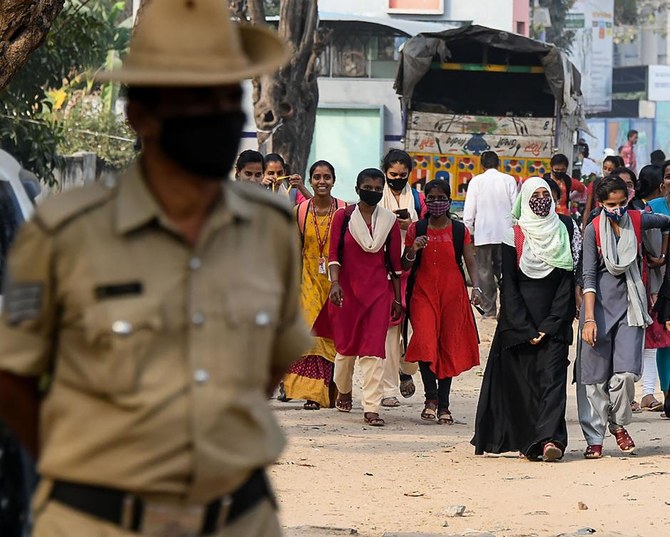Schools reopened in southern India under tight security on Wednesday with public gatherings banned following protests over Muslim girls wearing the hijab in classrooms.
Tensions have been high in Karnataka state since late last year when at least four schoolgirls were prevented from wearing the Muslim headscarf, sparking protests that have since spread across India.
In an attempt to calm tensions, Karnataka’s state government temporarily closed schools last week.
This came as the Karnataka High Court imposed a temporary ban on the wearing of all religious symbols in schools while it considers the headscarf ban.
As classrooms reopened in the state on Tuesday and Wednesday, police with batons were deployed outside several schools.
Authorities also imposed Section 144 — a law that prohibits gatherings of more than four people — in several districts.
There were no reports of disturbances but local media on Monday said several Muslim girls chose not to attend classes or sit exams when asked to remove their headscarves.
“We have grown up wearing the hijab since our childhood and we cannot give it up. I will not write the exam, I will go home,” the News Minute media outlet quoted a young girl as saying.
“Hindu students wear vermilion… Christian students wear a rosary, what is wrong if our children wear the hijab?” a parent told broadcaster NDTV.
Nasir Sharif, 43, said his 15-year-old daughter was told to take off her hijab at the school gates on Wednesday in Chikmagalur district. He persuaded school authorities to allow her to remove it only in class.
“My daughter has been wearing the hijab since she was five years old. It is to protect her dignity. What they are asking us to do is humiliating,” Sharif told AFP.
A video on social media that could not be independently verified showed around a dozen girls in burqas shouting, “We want justice! Allahu Akbar (God is most great),” after being prevented from entering class.
The row has heightened fears among Muslims in India, with many saying they feel under attack by the government of Hindu-nationalist Prime Minister Narendra Modi.
Rashad Hussain, US ambassador at large for international religious freedom, tweeted last week that hijab bans in schools “violate religious freedom and stigmatize and marginalize women and girls.”
The Indian government said in a statement that people “who know India well would have a proper appreciation of these realities.”
“Motivated comments on our internal issues are not welcome,” it added.

